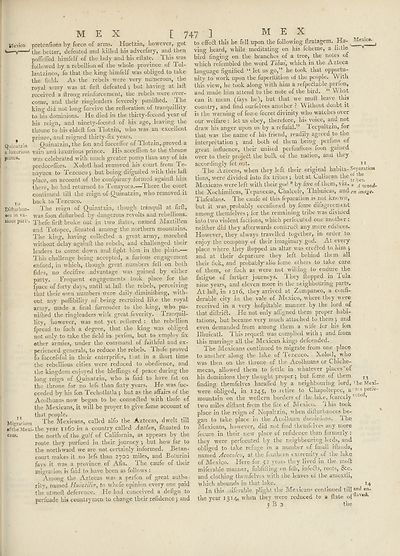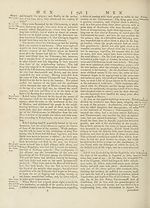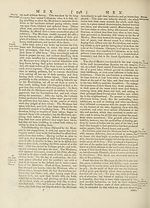Encyclopaedia Britannica, or, a Dictionary of arts, sciences, and miscellaneous literature : enlarged and improved. Illustrated with nearly six hundred engravings > Volume 13, MAT-MIC
(793) Page 747
Download files
Complete book:
Individual page:
Thumbnail gallery: Grid view | List view

HEX
[ 747 1
M E X
Mexico
Quinatzin
a luxurious
prince.
TO
Difturban-
«es in va¬
rious part'.
XI
Migrations
•fthe Mexi
cans.
pretenfions by force of arms. Huetzin, however, got
the better, defeated and killed his adverfary, and then
poffefled himfelf of the lady and his ellate. This was
followed by a rebellion of the whole province ol iol-
lantzinco, fo that the king himfelf was obliged to take
the field. As the rebels were very numerous, the
royal army was at firft defeated $ but having at laft
received a ftrong reinforcement, the rebels were over¬
come, and their ringleaders fcverely puniihed. The
king did not long furvive the reftoration of tranquillity
to his dominions. He died in the thirty-fecond year of
his reign, and ninety-fecond of his age, leaving the
throne to his el dell fon 1'iotzin, who was an excellent
prince, and reigned thirty-fix years.
Quinatzin, the fon and fucceffbr of llotzin, proved a
vain and luxurious prince. His accefiion to the throne
was celebrated with much greater pomp than any of his
predeceflors. Xolotl had removed his court from Te-
nayuca to Tezcuco $ but being difgufted with this laft
place, on account of the confpiracy formed againft him
there, he had returned to Tenayuca.— i here the court
continued till the reign of Quinatzin, who removed it
back to Tezcuco.
The reign of Quinatzin, though tranquil at firft,
was foon difturbed by dangerous revolts and rebellions.
Thefe firft broke out in two ftates, named Maztillen
and Totopec, fituated among the northern mountains.
The king, having colledted a great army, marched
without delay againft the rebels, and challenged their
leaders to come down and fight him in the plain.—
This challenge being accepted, a furious engagement
enfued, in which, though great numbers fell on both
fides, no decifive advantage was gained by either
party. Frequent engagements took place for the
fpace of forty days, until at laft the rebels, perceiving
that their own numbers were daily diminilhing, with¬
out any poflibility of being recruited like the royal
army, made a final furrender to the king, who pu-
nifhed the ringleaders with great feverity. i ranquil-
lity, however, was not yet reftored : the rebellion
fpread to fuch a degree, that the king was obliged
not only to take the field in perfon, but to employ fix
other armies, under the command of faithful and ex¬
perienced generals, to reduce the rebels. Thofe proved
fo fuccefsful in their enterprifes, that in a fliort time
the rebellious cities were reduced to obedience, and
the kingdom enjoyed the bleflings of peace during the
long reign of Quinatzin, who is faid to have lat on
the throne for no lefs than fixty years. He was fuc-
ceeded by his fon Techotlatla *, but as the affairs of the
Acolhuans now began to be conne<ftcd with thofe of
the Mexicans, it will be proper to give fome account of
that people.
The Mexicans, called alfo the Aztecas, dwelt till
the year 1160 in a country called Aztlan, fituated to
the north of the gulf of California, as appears by the
route they purfued in their journey 5 but how far to
the northward we are not certainly informed. Betan¬
court makes it no lefs than 2700 miles, and Boturini
fays it was a province of Alia. T he caufe of their
migration is faid to have been as follows :
Among the Aztecas was a perfon of great autho-
riiy, named Huixtilin, to whofe opinion every one paid
the utmoft deference. He had conceived a defign to
perfuade his countrymen to change their refidence; and
Mexico.
to effect this he fell upon the following ftratagem. Ha- i
ving heard, while meditating on his fcheme, a Ihtle
bird ling mg on the branches of a tree, the notes of
which rc fern bled the word Tihui, which in the Azteca
language fignified “ let us go,” he took that opportu¬
nity to work upon the fuperiiition of the people. W ith
this view, he took along with him a refpeCtable perlun,
and made him attend to the note of the bird. “ W hat
can it mean (lays he), but that we mult leave this
country, and find ourfelves another ? Without doubt it
is the warning of fome lecret divinity who watches over
our welfare : let us obey, therefore, hh voice, and not
draw his anger upon us by a refuial.” iecpaltzin, for
that was the name of his friend, readily agreed to the
interpretation and both of them being perfons of
great influence, their united perfuafions loon gained
over to their projedf the bulk of the nation, and they
accordingly fet out. _ _ 12 .
The Aztecas, when they left their original habita-Separation
tions, were divided into fix tribes •, but at Culiacan the
Mexicans were left with their god * by five of them, viz. * A
the Xoehimilcas, Ttpanecas, Chalcefe, 1 lahuicas, and en image.
Tlafcalans. The caufe oi this reparation is not knowm,
but it was probably occalioned by lome difagreemeiit
among themfelves} for the remaining tribe was divided
into two violent factions, which perfecuted one another :
neither did they afterwards conuruCf any more edifices.
However, they always travelled together, in order to
enjoy the company of their imaginary god. At every
place where they flopped an altar was creeled to him }
and at their departure they left behind them all
their lick, and probably* alio fome others to take care
of them, or fuch as were not willing to endure the
fatigue of farther journeys, 'i hey flopped in lula
nine years, and eleven more in the neighbouring parts.
At laft, in 1216, they arrived at Zumpaneo, a conli-
derable city in the vale of Mexico, where they were
received in a very hofpitable manner by the lord of
that diftridt. He not only alfigned them proper habi¬
tations, but became very much attached to them ; and
even demanded from among them a iviie for his fon
Ilhuicatl. This requeft was complied with ; and from
this marriage all the Mexican kings delcended.
The Mexicans continued to migrate from one place
to another along the lake of Tezcuco. Xoloil, who
was then on the throne of the Acolhuans or Chiche-
mecas, allowed them to fettle in whatever places'of
his dominions they thought proper \ but fome of them
finding themfelves haraffed by a neighbouring lord, ' he Mexi-
were obliged, in 1245, to it tire to Chapoltepec, a M-erie*
mountain on the weftern borders of the lake, fcarcely u tx ’
two miles diftant from the file of Mexico, i his took
place in the reign of Nopaltzin, when difturbances be¬
gan to take place in the Acolhuan dominions. The
Mexicans, however, did not find themfelves any more
fecure in their new place of refidence than formerly :
they were perfecuted Ly the neighbouring lords, and
obliged to take refuge in a number of fmall iflauds,
named Acocolco, at the fouthern extremity of the lake
of Mexico. Here for 52 years they lived in the moft
miferable manner, fubfifting on fiih, infeefs, roots, &c.
and clothing themfelves with the leaves of the amcxtli,
which abounds in that lake. 14
In this niferable plight the Mexicans continued till and en-
the year 1314, when they were reduced to a ftate of flav‘;41,
f B 2 the
[ 747 1
M E X
Mexico
Quinatzin
a luxurious
prince.
TO
Difturban-
«es in va¬
rious part'.
XI
Migrations
•fthe Mexi
cans.
pretenfions by force of arms. Huetzin, however, got
the better, defeated and killed his adverfary, and then
poffefled himfelf of the lady and his ellate. This was
followed by a rebellion of the whole province ol iol-
lantzinco, fo that the king himfelf was obliged to take
the field. As the rebels were very numerous, the
royal army was at firft defeated $ but having at laft
received a ftrong reinforcement, the rebels were over¬
come, and their ringleaders fcverely puniihed. The
king did not long furvive the reftoration of tranquillity
to his dominions. He died in the thirty-fecond year of
his reign, and ninety-fecond of his age, leaving the
throne to his el dell fon 1'iotzin, who was an excellent
prince, and reigned thirty-fix years.
Quinatzin, the fon and fucceffbr of llotzin, proved a
vain and luxurious prince. His accefiion to the throne
was celebrated with much greater pomp than any of his
predeceflors. Xolotl had removed his court from Te-
nayuca to Tezcuco $ but being difgufted with this laft
place, on account of the confpiracy formed againft him
there, he had returned to Tenayuca.— i here the court
continued till the reign of Quinatzin, who removed it
back to Tezcuco.
The reign of Quinatzin, though tranquil at firft,
was foon difturbed by dangerous revolts and rebellions.
Thefe firft broke out in two ftates, named Maztillen
and Totopec, fituated among the northern mountains.
The king, having colledted a great army, marched
without delay againft the rebels, and challenged their
leaders to come down and fight him in the plain.—
This challenge being accepted, a furious engagement
enfued, in which, though great numbers fell on both
fides, no decifive advantage was gained by either
party. Frequent engagements took place for the
fpace of forty days, until at laft the rebels, perceiving
that their own numbers were daily diminilhing, with¬
out any poflibility of being recruited like the royal
army, made a final furrender to the king, who pu-
nifhed the ringleaders with great feverity. i ranquil-
lity, however, was not yet reftored : the rebellion
fpread to fuch a degree, that the king was obliged
not only to take the field in perfon, but to employ fix
other armies, under the command of faithful and ex¬
perienced generals, to reduce the rebels. Thofe proved
fo fuccefsful in their enterprifes, that in a fliort time
the rebellious cities were reduced to obedience, and
the kingdom enjoyed the bleflings of peace during the
long reign of Quinatzin, who is faid to have lat on
the throne for no lefs than fixty years. He was fuc-
ceeded by his fon Techotlatla *, but as the affairs of the
Acolhuans now began to be conne<ftcd with thofe of
the Mexicans, it will be proper to give fome account of
that people.
The Mexicans, called alfo the Aztecas, dwelt till
the year 1160 in a country called Aztlan, fituated to
the north of the gulf of California, as appears by the
route they purfued in their journey 5 but how far to
the northward we are not certainly informed. Betan¬
court makes it no lefs than 2700 miles, and Boturini
fays it was a province of Alia. T he caufe of their
migration is faid to have been as follows :
Among the Aztecas was a perfon of great autho-
riiy, named Huixtilin, to whofe opinion every one paid
the utmoft deference. He had conceived a defign to
perfuade his countrymen to change their refidence; and
Mexico.
to effect this he fell upon the following ftratagem. Ha- i
ving heard, while meditating on his fcheme, a Ihtle
bird ling mg on the branches of a tree, the notes of
which rc fern bled the word Tihui, which in the Azteca
language fignified “ let us go,” he took that opportu¬
nity to work upon the fuperiiition of the people. W ith
this view, he took along with him a refpeCtable perlun,
and made him attend to the note of the bird. “ W hat
can it mean (lays he), but that we mult leave this
country, and find ourfelves another ? Without doubt it
is the warning of fome lecret divinity who watches over
our welfare : let us obey, therefore, hh voice, and not
draw his anger upon us by a refuial.” iecpaltzin, for
that was the name of his friend, readily agreed to the
interpretation and both of them being perfons of
great influence, their united perfuafions loon gained
over to their projedf the bulk of the nation, and they
accordingly fet out. _ _ 12 .
The Aztecas, when they left their original habita-Separation
tions, were divided into fix tribes •, but at Culiacan the
Mexicans were left with their god * by five of them, viz. * A
the Xoehimilcas, Ttpanecas, Chalcefe, 1 lahuicas, and en image.
Tlafcalans. The caufe oi this reparation is not knowm,
but it was probably occalioned by lome difagreemeiit
among themfelves} for the remaining tribe was divided
into two violent factions, which perfecuted one another :
neither did they afterwards conuruCf any more edifices.
However, they always travelled together, in order to
enjoy the company of their imaginary god. At every
place where they flopped an altar was creeled to him }
and at their departure they left behind them all
their lick, and probably* alio fome others to take care
of them, or fuch as were not willing to endure the
fatigue of farther journeys, 'i hey flopped in lula
nine years, and eleven more in the neighbouring parts.
At laft, in 1216, they arrived at Zumpaneo, a conli-
derable city in the vale of Mexico, where they were
received in a very hofpitable manner by the lord of
that diftridt. He not only alfigned them proper habi¬
tations, but became very much attached to them ; and
even demanded from among them a iviie for his fon
Ilhuicatl. This requeft was complied with ; and from
this marriage all the Mexican kings delcended.
The Mexicans continued to migrate from one place
to another along the lake of Tezcuco. Xoloil, who
was then on the throne of the Acolhuans or Chiche-
mecas, allowed them to fettle in whatever places'of
his dominions they thought proper \ but fome of them
finding themfelves haraffed by a neighbouring lord, ' he Mexi-
were obliged, in 1245, to it tire to Chapoltepec, a M-erie*
mountain on the weftern borders of the lake, fcarcely u tx ’
two miles diftant from the file of Mexico, i his took
place in the reign of Nopaltzin, when difturbances be¬
gan to take place in the Acolhuan dominions. The
Mexicans, however, did not find themfelves any more
fecure in their new place of refidence than formerly :
they were perfecuted Ly the neighbouring lords, and
obliged to take refuge in a number of fmall iflauds,
named Acocolco, at the fouthern extremity of the lake
of Mexico. Here for 52 years they lived in the moft
miferable manner, fubfifting on fiih, infeefs, roots, &c.
and clothing themfelves with the leaves of the amcxtli,
which abounds in that lake. 14
In this niferable plight the Mexicans continued till and en-
the year 1314, when they were reduced to a ftate of flav‘;41,
f B 2 the
Set display mode to:
![]() Universal Viewer |
Universal Viewer | ![]() Mirador |
Large image | Transcription
Mirador |
Large image | Transcription
Images and transcriptions on this page, including medium image downloads, may be used under the Creative Commons Attribution 4.0 International Licence unless otherwise stated. ![]()
| Permanent URL | https://digital.nls.uk/192694359 |
|---|
| Attribution and copyright: |
|
|---|
| Description | Ten editions of 'Encyclopaedia Britannica', issued from 1768-1903, in 231 volumes. Originally issued in 100 weekly parts (3 volumes) between 1768 and 1771 by publishers: Colin Macfarquhar and Andrew Bell (Edinburgh); editor: William Smellie: engraver: Andrew Bell. Expanded editions in the 19th century featured more volumes and contributions from leading experts in their fields. Managed and published in Edinburgh up to the 9th edition (25 volumes, from 1875-1889); the 10th edition (1902-1903) re-issued the 9th edition, with 11 supplementary volumes. |
|---|---|
| Additional NLS resources: |
|

